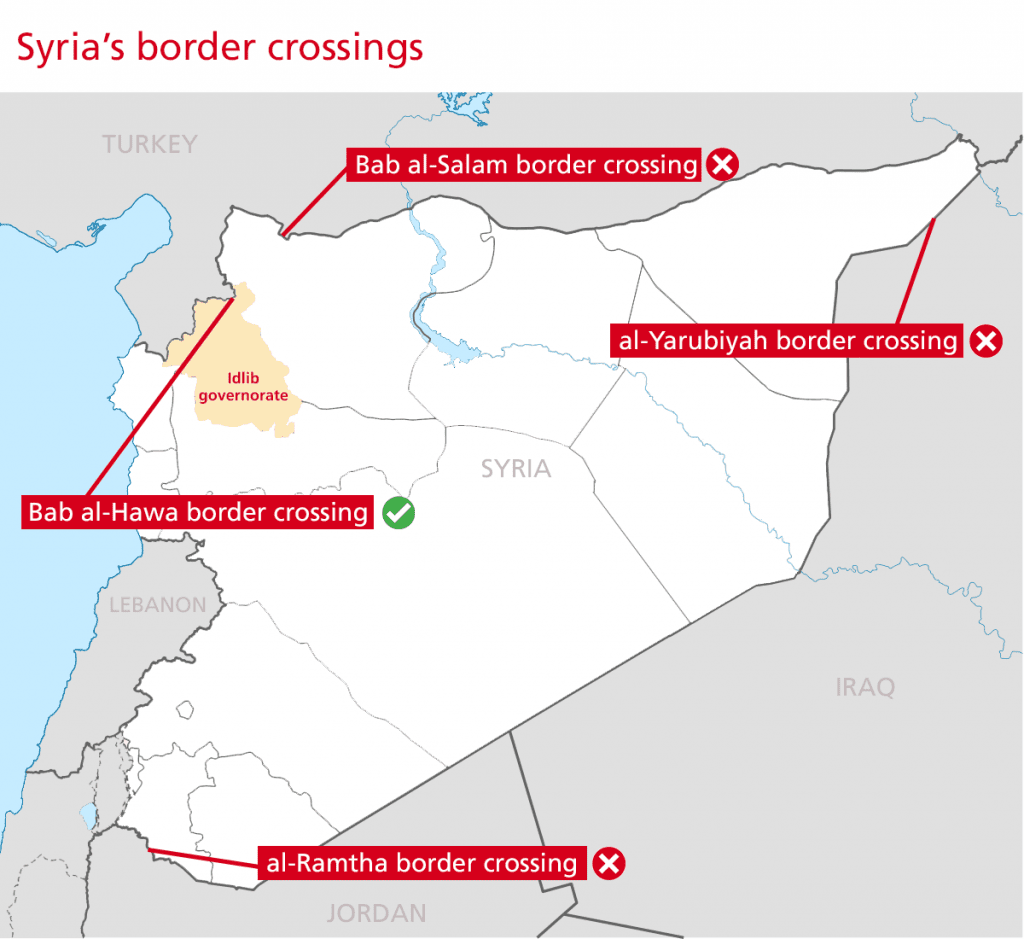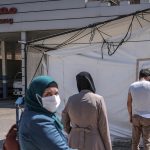An enormous humanitarian crisis may face the four million people in Syria’s northwest region, specifically the Idlib governorate, which currently relies on one lifeline to outside aid: the Bab al-Hawa border crossing from Türkiye. In the months leading up to the outbreak of the COVID-19 pandemic in late 2019 and early 2020, Idlib faced heavy aerial bombardment that targeted health workers and destroyed medical infrastructure. The violence was part of a Syrian government strategy in the country’s decade-long conflict of systematically attacking health care facilities and personnel in opposition-held areas.
The intense bombardment led to a major increase in internally displaced people in Idlib, who already numbered more than one million at the start of the pandemic. A recent UN briefing shows an emergency threshold of acute malnutrition, particularly among displaced children in Syria’s northwest. Displacement and malnutrition increase people’s risk of exposure to COVID-19 as well as their risk of severe outcomes if they contract the virus. This population, and an additional three million civilians across Syria’s northwest, are critically reliant on aid distribution reaching them through the Bab al-Hawa border crossing from Türkiye.

Dr. Yasser Najeeb, chair of the Technical Committee of the Syria Immunization Group (SIG) – the main consortium responsible for distributing vaccines – shared with PHR his on-the-ground perspective regarding the Bab al-Hawa crossing. “There is fear about the Bab al-Hawa crossing possibly closing,” Dr. Najeeb said in a phone call. “If it closes, it will be devastating.”
The aid that reaches the northwest through the Bab al-Hawa crossing is designated by the UN Security Council through resolution 2533. The Security Council votes annually to renew these UN-administered border crossings that deliver humanitarian aid convoys to civilians inside Syria. With the most recent annual renewals, more of the border crossings have closed, due to vetoes by permanent Security Council members Russia and China. As of June 2020, only the Bab al-Hawa crossing to Idlib remains open. This renewal is set to expire on July 10, 2021.
The Bab al-Hawa crossing must remain open – not only to supply critical aid, but also to address the ongoing COVID-19 pandemic
Last June, ahead of the 2020 border crossing renewal, PHR’s director of policy, Susannah Sirkin, briefed the Security Council, noting that “despite record-level cross-border aid deliveries into northwest Syria, the humanitarian needs remain overwhelming” and called on the Council to “enable humanitarian assistance through all available channels and to renew the cross-border aid resolution to secure access to lifesaving aid for the four million Syrians in need.” The same call stands today and is just as urgent, if not more so.
Vaccine distribution to the Northwest
More than half of the recorded COVID-19 cases in Syria have been in the northwest, where the COVID-19 tracking system is more sensitive in capturing cases. On April 21, 53,800 AstraZeneca vaccines were delivered to the northwest through the Bab al-Hawa crossing as part of the international COVAX initiative. With this shipment, Dr. Najeeb explained, the SIG plans to first vaccinate doctors and health care providers, then humanitarian workers, and then move to inoculate those over 60 or with comorbidities.
The plan to vaccinate IDPs is similar to the larger vaccine rollout plan across Idlib. “When we move to vaccinate those in certain age groups and those with comorbidities, this will include those in the camps,” said Dr. Najeeb. The SIG plans to eventually have 10 vaccination centers across the camps, when there are enough vaccines. It hopes to achieve a 60 percent full vaccination rate soon, which would require 2,500,000 people across northwest Syria to be vaccinated. To underscore the challenge of reaching this goal, COVAX, the main current supplier of vaccines, is only scheduled to deliver a total of 1.5 million vaccines to northwest Syria this year, according to current distribution plans, and has fallen behind projections in many parts of the world due to lower-than-expected production. In the immediate term, while pursuing larger-scale supply improvements, high-income countries should send already-purchased doses of the vaccine to COVAX to facilitate larger shipments to Syria’s northwest until the SIG’s goal of two-thirds vaccination is achieved.
In the meantime, the SIG says it has not been made aware of a second shipment date for COVID-19 vaccines. What’s more, the batch delivered in April entered through the Bab al-Hawa crossing – and the continuation of that access depends on a critical Security Council vote before the resolution expires on July 10.
The Bab al-Hawa crossing must remain open – not only to supply critical aid, but also to address the ongoing COVID-19 pandemic, including access to vaccines. Along with maintaining the northwest crossing, the Security Council should also reopen the other three crossings, al-Yarubiyah, al-Ramtha, and Bab al-Salam, particularly as residents in some areas retaken by the Syrian government face documented discrimination that has impeded their access to health. It would be unconscionable for the Security Council to block lifesaving help for the millions of women, men, and children who depend on it in this devastated area of Syria.

